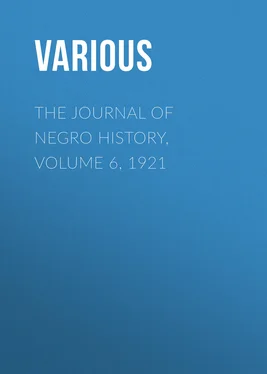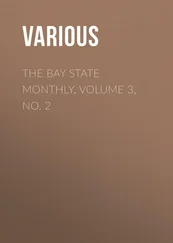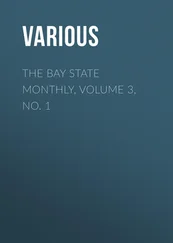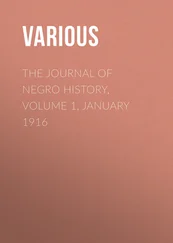Various - The Journal of Negro History, Volume 6, 1921
Здесь есть возможность читать онлайн «Various - The Journal of Negro History, Volume 6, 1921» — ознакомительный отрывок электронной книги совершенно бесплатно, а после прочтения отрывка купить полную версию. В некоторых случаях можно слушать аудио, скачать через торрент в формате fb2 и присутствует краткое содержание. Жанр: foreign_antique, periodic, История, foreign_edu, на английском языке. Описание произведения, (предисловие) а так же отзывы посетителей доступны на портале библиотеки ЛибКат.
- Название:The Journal of Negro History, Volume 6, 1921
- Автор:
- Жанр:
- Год:неизвестен
- ISBN:нет данных
- Рейтинг книги:4 / 5. Голосов: 1
-
Избранное:Добавить в избранное
- Отзывы:
-
Ваша оценка:
- 80
- 1
- 2
- 3
- 4
- 5
The Journal of Negro History, Volume 6, 1921: краткое содержание, описание и аннотация
Предлагаем к чтению аннотацию, описание, краткое содержание или предисловие (зависит от того, что написал сам автор книги «The Journal of Negro History, Volume 6, 1921»). Если вы не нашли необходимую информацию о книге — напишите в комментариях, мы постараемся отыскать её.
The Journal of Negro History, Volume 6, 1921 — читать онлайн ознакомительный отрывок
Ниже представлен текст книги, разбитый по страницам. Система сохранения места последней прочитанной страницы, позволяет с удобством читать онлайн бесплатно книгу «The Journal of Negro History, Volume 6, 1921», без необходимости каждый раз заново искать на чём Вы остановились. Поставьте закладку, и сможете в любой момент перейти на страницу, на которой закончили чтение.
Интервал:
Закладка:
Giving the opinion of the court in Civil Rights Cases, 20 20 109 U. S., 1.
Mr. Justice Bradley said that the Fourteenth Amendment on which this act of 1875 rested for its authority, if it had any authority at all, does not invest Congress to legislate within the domain of State legislation or in State action of the kind referred to in the Civil Rights Act. He believed that the Fourteenth Amendment does not authorize Congress to create a code of municipal law for the regulation of private rights. He conceded that positive rights and privileges are secured by the Fourteenth Amendment but only by prohibition against State laws and State proceedings affecting those rights. 21 21 United States v. Cruikshank , 92 U. S., 542; Virginia v. Rives , 100 U. S., 318; Ex Parte Virginia , 100 U. S., 339.
"Until some State law has passed," he said, "or some State action through its officers or agents has been taken, adverse to the rights of citizens sought to be protected by the Fourteenth Amendment, no legislation of the United States under said amendment, nor any proceeding under such legislation, can be called into activity; for the prohibitions of the amendment are against State laws and acts under State authority." Otherwise Congress would take the place of State legislatures and supersede them and regulate all private rights between man and man. Civil rights such as are guaranteed by the Constitution against State aggression, thought Justice Bradley, cannot be impaired by the wrongful acts of individuals unsupported by State authority in the shape of laws, customs, or executive proceedings, for those are private wrongs.
Justice Bradley believed, moreover, that the Civil Rights Act could not be supported by the Thirteenth Amendment in that, unlike the Fourteenth Amendment, the Thirteenth Amendment is primary and direct in abolishing slavery. "When a man has emerged from slavery," said he, "and by the aid of beneficent legislation has shaken off the inseparable concomitants of that state there must be some stage in the progress of his elevation when he takes the rank of a mere citizen, ceases to be the special favorite of the laws, and when his rights as a citizen or a man, are to be protected in the ordinary modes by which other men's rights are protected." To eject a Negro from an inn or a hotel, to compel him to ride in a separate car, to deny him access and use of places maintained at public expense, according to Justice Bradley, do not constitute imposing upon the Negroes badges and incidents of slavery; for they are acts of individuals with which Congress, because of the limited powers of the Federal government, cannot have anything to do. The particular clause in the Civil Rights Act, so far as it operated on individuals in the several States was, therefore, held null and void, but the court held that it might apply to the District of Columbia and territories of the United States for which Congress might legislate directly. Since then the court has in the recent Wright Case declared null and void even that part which it formerly said might apply to territory governed directly by Congress, thus taking the position tantamount to reading into the laws of the United States and the laws of nations the segregation measures of a mediaeval ex-slaveholding commonwealth assisted by the nation in enforcing obedience to its will beyond the three mile limit on the high seas.
Although conceding that the Thirteenth Amendment was direct and primary legislation, the court held that it had nothing to do with the guarantee against that race discrimination commonly referred to in the bills of complaint as the badges and incidents of slavery. The court found the Fourteenth Amendment negative rather than direct and primary because of one of its clauses providing that "no State shall make or enforce any law which shall abridge the privileges and immunities of citizens of the United States nor shall any State deprive any person of life, liberty and property without due process of law, nor deny to any person within its jurisdiction the equal protection of the laws." The court was too evasive or too stupid to observe that the first clause of this amendment was an affirmation to the effect that all persons born and naturalized in the United States and subject to the jurisdiction thereof are citizens of the United States and of the State wherein they reside. In other words, the court held that if there is one negative clause in a paragraph, the whole paragraph is a negation. Such sophistry deserves the condemnation of all fairminded people, when one must conclude that any person even without formal education, if he has heard the English language spoken and is of sound mind, would know better than to interpret a law so unreasonably.
In declaring this act unconstitutional the Supreme Court of the United States violated one of its own important principles of interpretation to the effect that this duty is such a delicate one, that the court in declaring a statute of Congress invalid must do so with caution, reluctance and hesitation and never until the duty becomes manifestly imperative. In the decision of Fletcher v. Peck , 22 22 6 Cranch, 128.
the court said that whether the legislative department of the government has transcended the limits of its constitutional power is at all times a question of much delicacy, which seldom, if ever, is to be decided in the affirmative, in a doubtful case. The position between the Constitution and the law should be such that the judge feels a clear and strong conviction of their incompatibility with each other. In the Sinking Fund Cases 23 23 99 U. S., 418.
the court said: "When required in the regular course of judicial proceedings to declare an act of Congress void if not within the legislative power of the United States, this declaration should never be made except in a clear case. Every possible presumption is in favor of the validity of a statute, and this continues until the contrary is shown beyond a rational doubt. One branch of the government cannot encroach on the domain of another without danger. The safety of our institutions depends in no small degree on a strict observance of this salutary rule." And this is exactly what happened. The judiciary here assumed the function of the legislative department. Not even a casual reader on examining these laws and the Constitution can feel that the court in this case felt such a clear and strong conviction as to the invalidity of this constitutional legislation when that tribunal, as its records show, had under different circumstances before the Civil War held a doctrine decidedly to the contrary.
Mr. Justice Harlan, therefore, dissented. He considered the opinion of the court narrow, as the substance and spirit were sacrificed by a subtle and ingenious verbal criticism. Justice Harlan believed, "that it is not the words of the law but the internal sense of it that makes the law; the letter of the law is the body, the sense and reason of the law the soul." "Constitutional provisions adopted in the interest of liberty," said Justice Harlan, "and for the purpose of securing, through national legislation, if need be, rights inhering in a state of freedom, and belonging to American citizenship, have been so construed as to defeat the end the people desire to accomplish, which they attempted to accomplish, and which they supposed they had accomplished, by changes in their fundamental law."
The court, according to Justice Harlan, although he did not mean to say that the determination in this case should have been materially controlled by considerations of mere expediency or policy, had departed from the familiar rule requiring that the purpose of the law or Constitution and the objects to be accomplished by any grant are often the most important in reaching real intent just as the debates in the convention of 1787 and the discussions in the Federalist and in the ratifying conventions of the States have often been referred to as throwing important light on clauses in the Constitution seeming to show ambiguity. The debates on the war amendment, when they were proposed and ratified, were thoroughly expounded before the court in bringing before that tribunal the intention of the members of Congress, by which the court, according to a well established principle of interpretation, should have been influenced in construing the statute in question.
Читать дальшеИнтервал:
Закладка:
Похожие книги на «The Journal of Negro History, Volume 6, 1921»
Представляем Вашему вниманию похожие книги на «The Journal of Negro History, Volume 6, 1921» списком для выбора. Мы отобрали схожую по названию и смыслу литературу в надежде предоставить читателям больше вариантов отыскать новые, интересные, ещё непрочитанные произведения.
Обсуждение, отзывы о книге «The Journal of Negro History, Volume 6, 1921» и просто собственные мнения читателей. Оставьте ваши комментарии, напишите, что Вы думаете о произведении, его смысле или главных героях. Укажите что конкретно понравилось, а что нет, и почему Вы так считаете.












